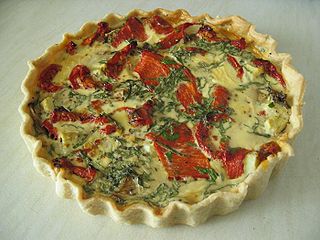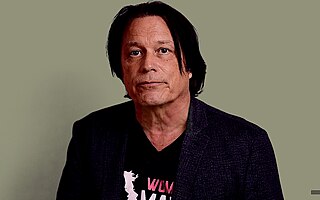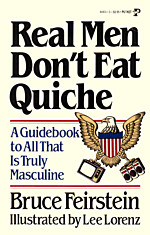
Quiche is a French tart consisting of pastry crust filled with savoury custard and pieces of cheese, meat, seafood or vegetables. A well-known variant is quiche Lorraine, which includes lardons or bacon. Quiche may be served hot, warm or cold.

Masculinity is a set of attributes, behaviors, and roles associated with men and boys. Masculinity can be theoretically understood as socially constructed, and there is also evidence that some behaviors considered masculine are influenced by both cultural factors and biological factors. To what extent masculinity is biologically or socially influenced is subject to debate. It is distinct from the definition of the biological male sex, as anyone can exhibit masculine traits. Standards of masculinity vary across different cultures and historical periods.

A home, or domicile, is a space used as a permanent or semi-permanent residence for one or many humans, and sometimes various companion animals. It is a fully- or semi-sheltered space and can have both interior and exterior aspects to it. Homes provide sheltered spaces, for instance rooms, where domestic activity can be performed such as sleeping, preparing food, eating and hygiene as well as providing spaces for work and leisure such as remote working, studying and playing.
Bruce Feirstein is an American screenwriter and humorist, best known for his contributions to the James Bond series and his best-selling humor books, including Real Men Don't Eat Quiche and Nice Guys Sleep Alone. Real Men Don't Eat Quiche was on The New York Times Best Seller List for 53 weeks.
"Real Programmers Don't Use Pascal" is an essay about computer programming written by Ed Post of Tektronix, Inc., and published in July 1983 as a letter to the editor in Datamation.
Men's studies is an interdisciplinary academic field devoted to topics concerning men, masculinity, gender, culture, politics and sexuality. It academically examines what it means to be a man in contemporary society.

Sociology of gender is a prominent subfield of sociology. Social interaction directly correlated with sociology regarding social structure. One of the most important social structures is status. This is determined based on position that an individual possesses which effects how they will be treated by society. One of the most important statuses an individual claims is gender. Public discourse and the academic literature generally use the term gender for the perceived or projected (self-identified) masculinity or femininity of a person.
Michael G. Flood is an Australian sociologist and an associate professor at the Queensland University of Technology School of Justice. Flood gained his doctorate in gender and sexuality studies from the Australian National University. His areas of research are on violence against women, fathering, pro-feminism, domestic violence, the effects of pornography on young people, safe sex among heterosexual men, men's movements as a backlash to the feminist movement, men's relationships with each other and with women, homophobia, men's health, and gender justice. He is a regular contributor to and is regularly quoted in the media on these and other issues.
The gender binary is the classification of gender into two distinct forms of masculine and feminine, whether by social system, cultural belief, or both simultaneously. Most cultures use a gender binary, having two genders.
Hypermasculinity is a psychological and sociological term for the exaggeration of male stereotypical behavior, such as an emphasis on physical strength, aggression, and human male sexuality. Within psychology, this term has been used ever since the publication of research by Donald L. Mosher and Mark Sirkin in 1984. Mosher and Sirkin operationally define hypermasculinity or the "macho personality" as consisting of three variables:
Sexual capital or erotic capital is the social power an individual or group accrues as a result of their sexual attractiveness and social charm. It enables social mobility independent of class origin because sexual capital is convertible, and may be useful in acquiring other forms of capital, including social capital and economic capital.
In gender studies, hegemonic masculinity is part of R. W. Connell's gender order theory, which recognizes multiple masculinities that vary across time, society, culture, and the individual. Hegemonic masculinity is defined as a practice that legitimizes men's dominant position in society and justifies the subordination of the common male population and women, and other marginalized ways of being a man. Conceptually, hegemonic masculinity proposes to explain how and why men maintain dominant social roles over women, and other gender identities, which are perceived as "feminine" in a given society.

A man is an adult male human. Prior to adulthood, a male human is referred to as a boy.
Gender & History is an international academic journal. It is an important academic journal for articles relating to the history of femininity, masculinity, and gender relations. The current editors are Rosemary Elliot, Maud Bracke, James Simpson, and Stuart Airlie in Glasgow, Scotland, and Cheryl Krasnick Warsh, Cathryn Spence, and Katharine Rollwagen in Nanaimo, British Columbia, Canada.

The psychology of eating meat is a complex area of study illustrating the confluence of morality, emotions, cognition, and personality characteristics. Research into the psychological and cultural factors of meat-eating suggests correlations with masculinity, support for hierarchical values, and reduced openness to experience. Because meat eating is widely practiced but is sometimes associated with ambivalence, it has been used as a case study in moral psychology to illustrate theories of cognitive dissonance and moral disengagement. Research into the consumer psychology of meat is relevant both to meat industry marketing and to advocates of reduced meat consumption.
Alpha male and beta male, or simply put alpha and beta, are pseudoscientific terms for men derived from the designation for alpha and beta animals in ethology. They may also be used with other genders, such as women, or additionally use other letters of the Greek alphabet. The popularization of these terms to describe humans has been widely criticized by scientists.
Vegaphobia or vegephobia is an aversion to, or dislike of, vegetarians and vegans. The term first appeared in the 2010s, coinciding with the rise in veganism in the late 2010s. Several studies have found an incidence of vegaphobic sentiments in the general population. Positive feelings regarding vegetarians and vegans also exist. Because of their diet, others may perceive them as more virtuous, more principled.

Dude food is a food trend largely consisting of heavy meaty dishes that are thought to appeal to men or express masculinity. Dishes such as hamburgers, hot dogs, or barbecue ribs may also be considered dude food, though dude food versions of these dishes often distinguish themselves with exaggerated use of specific ingredients such as whiskey, barbecue sauce, bacon, or cheese.

Thomas Keith is an American filmmaker, educator, and anti-sexist activist. He received both his Masters and Ph.D. in Philosophy from Claremont Graduate University. Keith is a professor of philosophy at California State Polytechnic University, Pomona and gender studies at Claremont Graduate University. He speaks to audiences throughout the United States on issues of masculinity, gender violence, media, and popular culture.
Chris (Christine) Beasley is an Australian researcher whose interdisciplinary work crosses the fields of social and political theory, gender and sexuality studies and cultural studies. She is Emerita Professor in the Department of Politics and International Relations, University of Adelaide. She is an elected Fellow of the Australian Academy of Social Sciences. In 2018, Beasley was named the leading researcher in feminism and women's studies in Australia based on major journal publications in the field. Beasley was the founder and inaugural co-Director of the Fay Gale Centre from 2009 to 2013.








